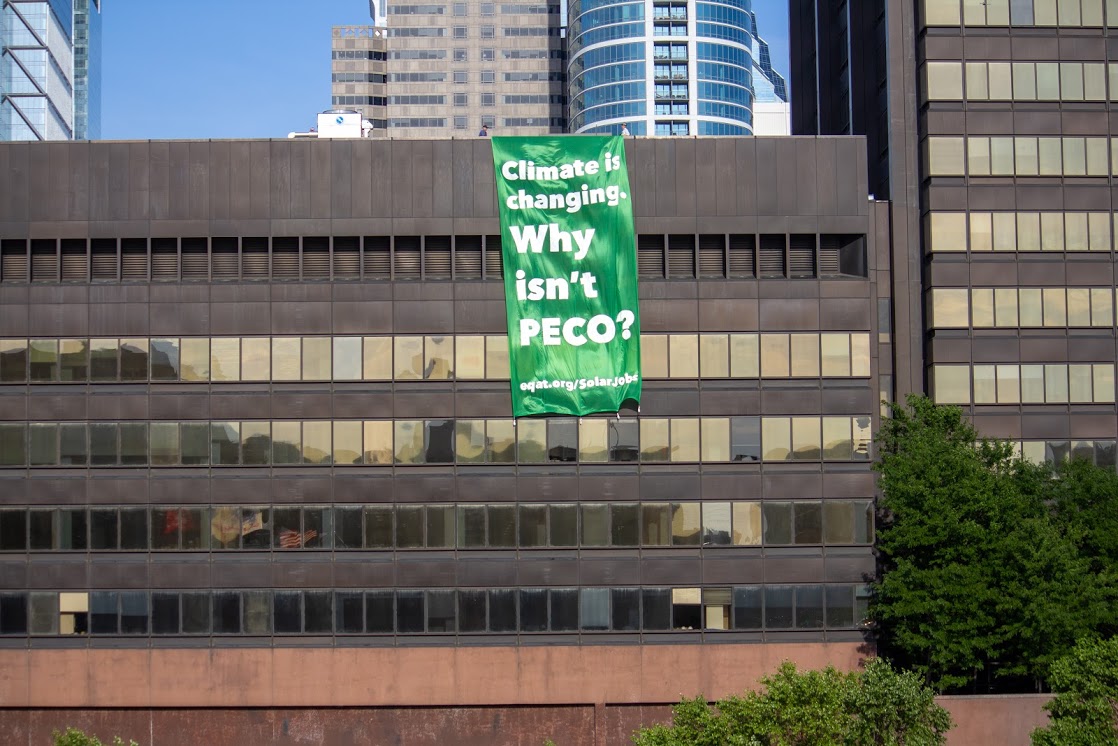By Jillian Baxter
As the city experienced its hottest day of the year on July 19th, the Earth Quaker Action Team (EQAT) dropped a 50-foot banner from the roof of PECO’s Market Street headquarters that read: “Climate is Changing: Why isn’t PECO?” Three EQAT members, who hopped a fence to drop the banner while on a tour of PECO’s green roof, were arrested and taken to a nearby police station.
This protest occurs on the heels of a meeting last month between PECO CEO Mike Innocenzo and EQAT, where EQAT members pushed for the company to source 20 percent of its energy through solar power derived from local producers. The group’s demand is unique. PECO typically distributes energy from suppliers, however because solar companies do not exist in this area at that capacity, EQAT’s demands, according to PECO officials, would require the company to set up solar energy generators of its own.
“Mike Innocenzo appears more interested in protecting short-term profits than in aligning PECO with the long-term interests of our region’s residents,” says EQAT campaign director Tabitha Skervin. “We see the Philadelphia Energy Solutions refinery in ashes, its workers holding pink slips, and our kids coughing on bad air today and tomorrow as PECO procrastinates. Now is the time for PECO, and its parent company Exelon, to invest major resources into bringing jobs that advance a democratic, renewable, and equitable energy economy—particularly in communities of color within its service area.”
PECO counters that this is an unrealistic number, saying that 20 percent local solar energy would require more than 827,000 rooftops in this area when fewer than 700,000 exist.
“Alternatively, cheaper, more efficient solar local energy could come from larger ground-based systems, but that would require 40,000 acres of land — 30 times the size of Center City and 20 times the size of Fairmount Park,” says Afia Ohene-Frempong, PECO communications manager. “We simply do not have the space.”
In a press release about the meeting, EQAT stated that Innocenzo refused to envision a clean-energy future for the Philly area “in which PECO partners with homeowners and businesses to expand rooftop solar capacity while creating well-paying jobs in the city’s low-income neighborhoods and suburban towns.”
According to Ohene-Frempong, even if the funds and space were available, in order to reach that 20 percent commitment by 2025 PECO would have to start building immediately.
“We would have to hire solar installation companies immediately. They would have to use the personnel they currently have immediately. They would likely be from several other areas and states,” she says. “The idea that we could make this commitment and create immediate jobs for low-income residents in our region that currently have zero training or employment history in solar is impossible. Once solar panels are up, there really isn’t much more ‘work’ to be done.”
Ohene-Frempong also says that EQAT’s demands are financially unattainable as the solar energy quota would cost $15 billion in capital investment.
“That’s three times more than PECO will be spending over the next five years,” she says. “We’d have to stop everything else we invest in — poles, wires, transformers, substations — and only spend on building solar farms to achieve this demand by 2025. The annual energy bill for customers would increase $1,300 per year. We have an obligation to the city to provide affordable energy above all else.”
EQAT, however, says that these numbers are inflated.
“It’s clear PECO is repeatedly and deliberately obfuscating our demands and misrepresenting the costs, and in doing so they ignore the cost of their inaction,” Skervin counters. “So far all we’ve seen is they are more invested in excuses than they are in the people of Philadelphia. 20 percent local solar is a realistic goal in the context of an emergency collision between an overheating planet cooked by fossil fuels and a city facing extreme inequality.”
According to PECO, any attempt at compromise has been rebuffed by EQAT.
“Not only has EQAT stated that the 20 percent demand is an all or nothing dictate, they have also stated that they will not work with PECO on solar jobs or local workforce development unless and until PECO agrees to all of their demands. They’ve refused anything short of 20 percent and have committed to continuing protests not only after we make the verbal commitment, but until we actually reach it,” Othene-Frempong says. “At no point have they come to us prepared with analysis that says this is possible.”
“As we told PECO CEO Mike Innocenzo when we met with him last month, we know a commitment to 20 percent local solar, when done in a just way that prioritizes community-owned solar projects, is reasonable, possible, and necessary,” says Skervin. “Rather than rising to meet the moral urgency of climate change, PECO is repeating inflated, ridiculous numbers and shrugging their shoulders.”
After the banner drop, a subsequent meeting that had been scheduled between EQAT and Exelon CEO Chris Crane was cancelled.





